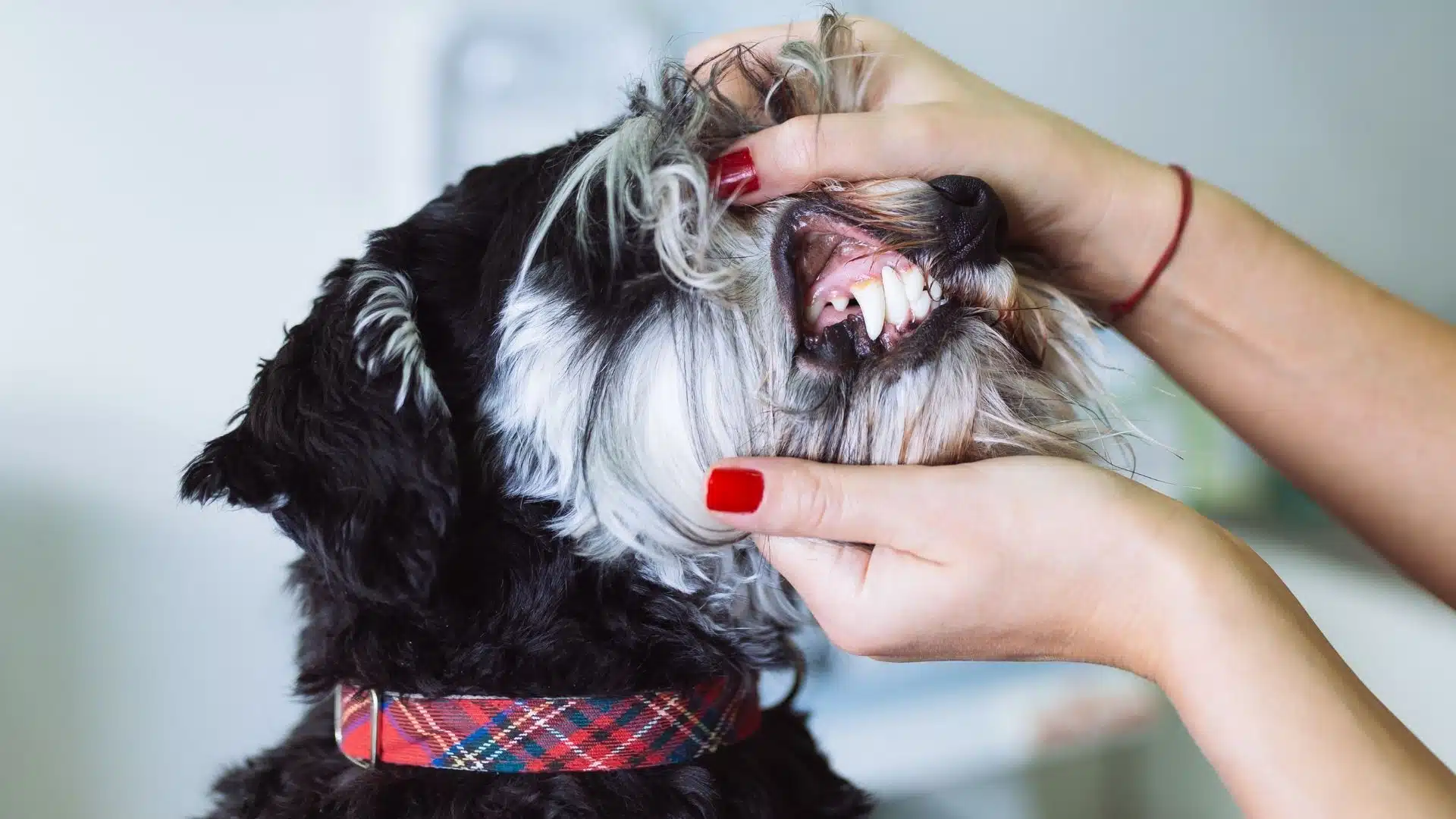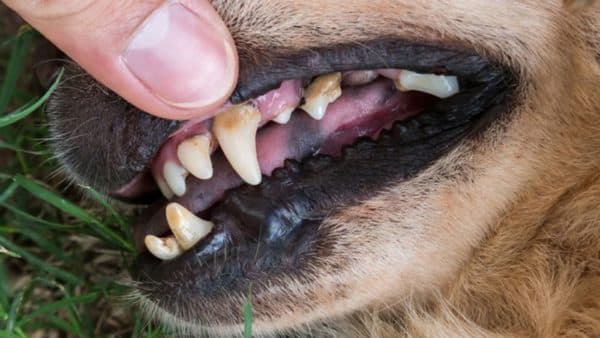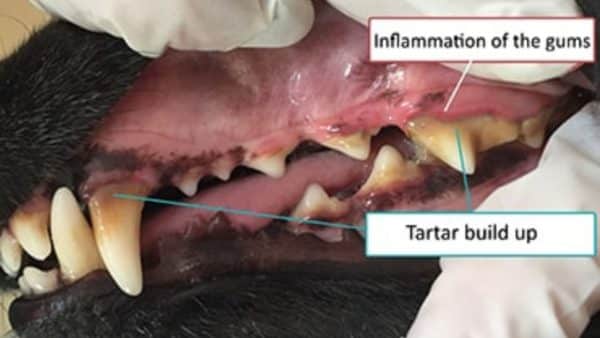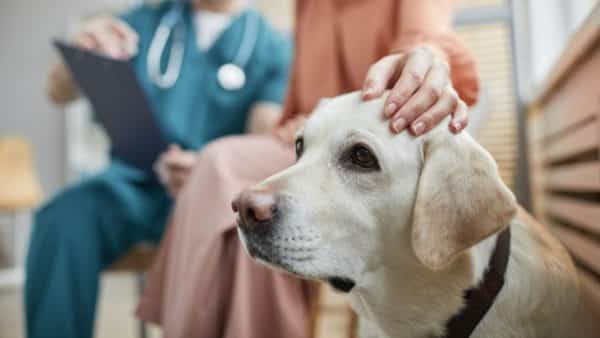

Periodontal disease in dogs is a progression of dental diseases. At first, your dog may just have a mild amount of tartar buildup. Its breath may start to smell bad. If left untreated this can develop into periodontal disease which is when the bacteria will cause damage to the gums, bones, and ligaments that hold the teeth in place.
Many times periodontal disease affects teeth under the gum line and is often not noticed until this has reached advanced stages in your dog. Most dogs without any treatment or prevention of periodontal disease will have dental issues by the time that your dog is three years old. Maintaining a regular cleaning routine can make a difference in the quality of life your dog will have!

Periodontal disease can greatly vary. At first, your dog’s teeth may look great but they have issues below the gum line. As the disease progresses your can notice more issues within your dog’s mouth and your dog may have more outward signs. The best way to assess dental disease in dogs is to sedate your dog and take an X-ray and examination below the gum line.
Many times you may not notice any signs in early on in the disease process. As your dog’s periodontal disease becomes more severe you will notice signs. Common signs of periodontal disease in dogs are:
If you notice any of these signs it would be best for your dog to see your vet. They can examine your dog’s mouth to see if there are signs common with periodontal disease. They can advise you on steps you can take to help keep your dog’s dental disease to progress to more severe and irreversible disease.
Elevate your dog’s oral health with our top-rated products designed for maintaining those pearly whites. From toothbrushes and toothpaste to dental chews and water additives, our carefully curated selection ensures comprehensive care for your canine companion’s teeth and gums. Regular dental hygiene is crucial for preventing plaque, tartar, and maintaining fresh breath.
Is your pet safe?
1 in 3 pets will need emergency veterinary treatment each year and it is estimated a pet receives emergency care every 2.5 seconds in the U.S.
The average cost of treating a broken bone in dogs is $2,700. Cancer treatments? Up to $10,000.
It’s why so many pet owners say their biggest regret isn’t the vet bill—it’s not having pet insurance when they needed it most.
Ask yourself: “If an unexpected $5,000 vet bill hit tomorrow, could I afford it?”
If the answer is no, it’s time to get covered.
Take a look at Lemonade. They have a great app that actually works, they have an instant chatbot that is faster and, dare we say it, friendlier than most companies’ “real” customer service and a quick scroll through Reddit will uncover… people are really vibing with this brand.
So go check them out and take a look. It takes less than a minute.
If your dog has gum disease there are many ways to treat it depending on the severity of the dental disease. Below are ways to treat gum disease in your dog, depending on the stage it’s in.
If your dog just has mild dental issues, you can start with brushing your dog’s teeth. This will help remove mild buildup on your dog’s teeth and prevent them from developing severe dental disease.
For moderate dental disease, your dog may need a dental cleaning done at your vet but there may be some preventative measures that you can take at home to help. Using a water additive such as mouth wash, dental chews, and even dental treats can help toward preventing dental diseases.

If your dog has a very severe dental disease they will need a dental cleaning at your vet’s office. Your vet will lightly sedate your dog and fully clean their mouth, take dental x-rays and extract any diseased teeth. They can also help treat any infected gums or other issues in your dog’s mouth.
Your dog will have to undergo anesthesia for these types of cleanings as your dog will not sit still with its mouth open as people do at the dentist.

Prevention is the best way to treat dental disease in your dog. It is absolutely critical to have a regular dental cleaning routine with your dog to prevent more damage to its teeth. Even adding a water additive such Alpha Paw’s Magic Mouth Wash can aid in keeping your dog’s teeth cleaner. Below is a list of the things you can do to help prevent your dog from suffering dental issues.
Small dog breeds such as the Dachshund to large dog breeds such as the Great Dane all need regular dental checkups to maintain good oral health!
If you can train your dog to tolerate teeth brushing this will help remove any tartar from your dog’s mouth and prevent dental disease. It is best to brush your dog’s teeth each day for the best results. While many times this is not possible, even a few times a week will help.
There are many great dental treats that you can give to your dog. Giving your dog this chew will help remove tartar and plaque. When looking for a dog chew, look for chews that are approved by the Dental Veterinary Health Council. These chews are backed by research showing that they actually do what they claim to help with. These chew and treats are also safe for your dog’s teeth and health.
Staying on top of your dog’s dental health will help their teeth stay healthy. Scheduling a routine dental health check every 6 to 12 months will help you detect and prevent dental issues before they become a major problem. If you notice any of the signs of dental disease, having your vet check your dog’s mouth will help keep your dog healthy and happy.
Providing your dog with a chew stick such as Alpha Paw’s Dentalicious sticks, and other toys will help decrease plaque and tartar on their teeth. Make sure that these dog chews are not too hard as they can also cause your dog to break a tooth.
A good rule to follow is if you can make an indention into the chew with your fingernail, it is okay to give to your dog. Some dogs are very aggressive chewers and can fully chew up a treat within a few seconds. Make sure that your dog is actually chewing the treat and not swallowing it whole as this can cause even more issues for your dog.

There are additives that you can put into your dog’s drinking water to help with their breath and dental disease. When offering these additives, also make sure that you give your dog fresh water to drink as some dogs do not like the additives and will not drink the water.
If you notice that your dog is having an issue with their teeth or seem to not want to eat as much as normal, it would be best for you to look at their teeth. Periodontal disease can show no outward signs at first and as it progressed can become severe very fast.
Many times the issue with dental disease is what is below the gum line and not easy for your to see. Your vet can sedate your dog and examine the gums and roots of your dog’s teeth to see if there are any issues.
With quick treatment and these few prevention tricks, your dog can live for many years with great breath and a healthy mouth.
If you enjoyed reading this article, head over to our Vet Corner where more articles can be found.
Most of us train our dogs when they are puppies to jump up on furniture. We think it’s harmless (and easier than always lifting them), but for dogs, couches and beds are very high compared to the size of their bodies.
Every time they jump it compresses their back and applies enormous force to their joints.
It’s no wonder that an incredible 80% of dogs experience arthritis or joint pain by only 7 years old.
Luckily, there is a vet-recommended solution.
It’s the PawRamp by Alpha Paw. An adjustable ramp that allows dogs to safely get on and off couches and beds. PawRamp makes joining you in bed or on the couch effortless and fun.
As a bonus, you can use code SAVE35 to get $35 off the PawRamp today.

The medical, nutritional, or behavioral advice we provide is intended for informational and educational purposes only. Our editorial content is not a substitute for formal or personalized medical advice from a veterinary professional. Only board-certified veterinary specialists who have examined your pet should diagnose medical conditions, provide personalized treatment, or prescribe appropriate medication. For questions regarding your pet’s health, or if your pet is exhibiting signs of illness, injury, or distress, contact your veterinarian immediately. Never disregard professional medical advice or delay in seeking it because of something you have read on our site.